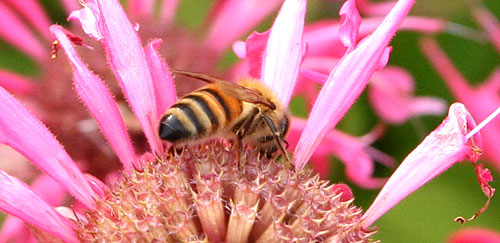
Score another one for biodiversity. Â Seems like I recall someone pointing out that narrow honeybee genetics might be one of the contributing factors to colony collapse disorder. (Read more pollinator posts.)
From a Cornell Chronicle article summarizing a paper in the July 20 issue of Science:
To study the reasons for honeybees’ promiscuity, the Cornell biologists inseminated 12 queens with sperm from 15 drones (a different set for each) and nine additional queens with sperm from a single drone (but a different one in each case). They then prompted the hives to swarm in early June to form new colonies.
“After only two weeks of building new nests, the genetically diverse colonies constructed 30 percent more comb, stored 39 percent more food and maintained foraging levels that were 27 to 78 percent higher than genetically uniform colonies,” said Mattila.
By the end of the summer, the genetically diverse colonies had five times more bees, eight times more reproductive males and heavier average body weights, mostly because of larger amounts of stored food.
By winter’s end, 25 percent of the genetically diverse colonies survived to their one-year anniversary (only about 20 percent of new honeybee colonies make it that long in upstate New York). But all of the genetically uniform hives starved to death.
“These differences are noteworthy considering colonies had similarly sized worker populations when they were first formed,” said Mattila. “Undoubtedly, our results reveal enormous benefits of genetic diversity for the productivity of honeybee colonies.”
And don’t miss Amy’s great post about bee gardening over at GardenRant, including this video from KQED:


Thanks for the bee information. I have been trying to learn more about the honey bees recently. Before this latest problem I was more concerned about the native bees and the lack of information on habitats and individual differences in niche dependence.
What I have read has made me sad for honey bees. Taking so much honey that they are near starvation and have to rely on candy like concoctions from beekeepers. Robber bees ,when stores are low ,taking from other hives? Not to mention all the fumigants used for mites and fungus, yuck… I may never eat honey again.
Maybe what is learned from this will make us better in our interactions with bees of any sort then be expanded into other relationships. Humans are taking up more and more space edging out or trying to dominate all other species. We must learn a better way or we will soon be at saturation levels where a crash is inevitable. That can happen so many ways it is scary to think about so I am going to plant more flowers…